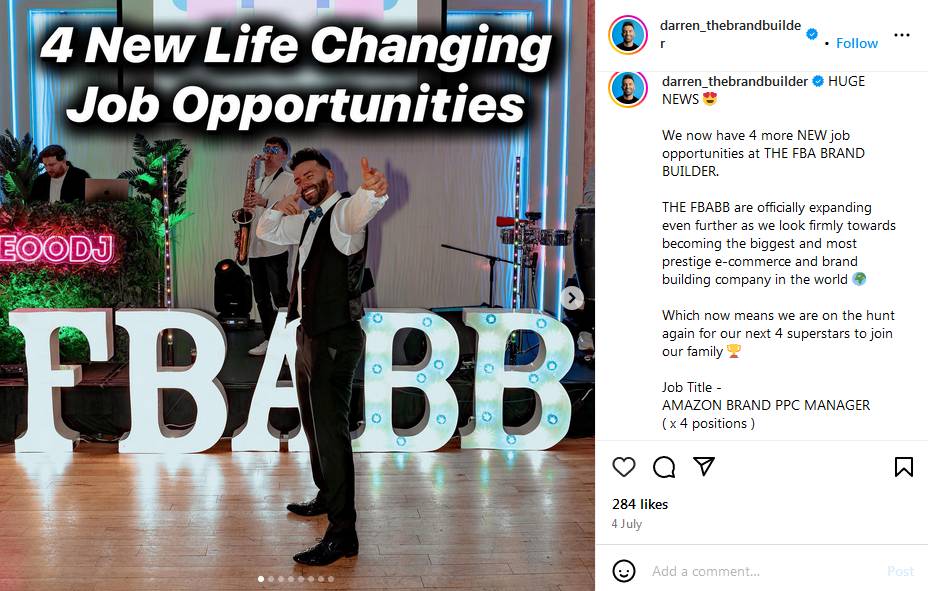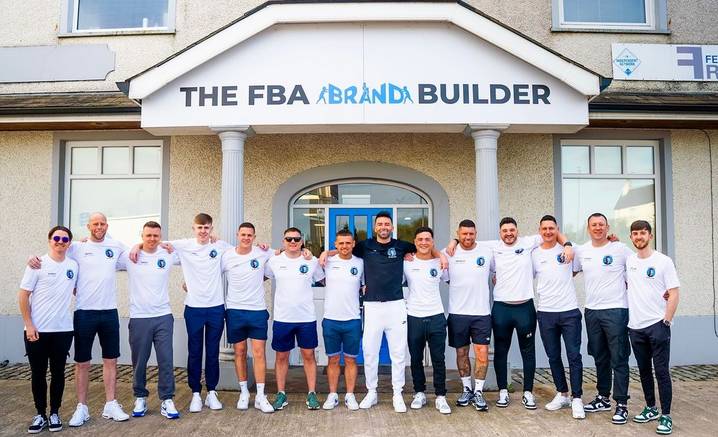Darren Campbell’s FBA Brand Builder program continues to flood social media with bold promises and aspirational messaging. The strategy underpinning his marketing relies heavily on creating a perception of transformation—from financial hardship to entrepreneurial success.
Through carefully crafted email campaigns, a network of influencers showcasing their newfound lifestyles, and a consistent social media presence, Campbell has built a compelling image for his program. However, there are significant gaps in credibility, transparency, and authenticity that raise questions for prospective clients.
The Consistent Hardship-to-Success Narrative
One of the most recognizable themes in Darren Campbell’s marketing is the story of overcoming hardship. Whether through his email campaigns or social media posts, the core message remains the same: you can break free from the drudgery of a traditional 9-5 job and achieve financial freedom by building your own Amazon brand. His recent email campaign exemplifies this, beginning with relatable questions like, “Remember your first day at your 9-5?” and contrasting the limitations of traditional employment with the unlimited potential of running a business.
Campbell’s email further drives this point home with quotes such as, “Because you’re paid for your TIME. And that’s the biggest fucking scam of all,” which taps into readers’ frustrations with conventional jobs. He emphasizes the benefits of entrepreneurship with lines like, “You can have a hard time struggling to make rent and working for someone else’s dreams. OR… You can have a hard time making 5 figures a month and making your dreams a reality.” This narrative establishes a stark choice between staying trapped in a job or striving for entrepreneurial freedom—a theme consistently echoed by the influencers promoting his program.
This narrative is further reinforced by Campbell’s influencers, who share similar “rags to riches” stories across social media. Posts often include captions like, “This is how I changed my life,” and showcase luxury cars, vacations, and moments of success. These individuals—ranging from Mark McKay to Paul David Matthews and others—depict a life transformed by the FBA Brand Builder program. While these stories are compelling, they follow a suspiciously uniform script that aligns too neatly with Campbell’s core messaging.

The Problem of Credibility
A deeper examination of this network reveals a glaring issue: a lack of credibility from those outside Campbell’s immediate circle. While the influencers associated with FBA Brand Builder consistently promote their success stories, there’s an absence of endorsements from well-established marketing professionals or external industry experts. The program seems self-contained, with little validation beyond the curated network of influencers whose ties to Campbell remain ambiguous.
Additionally, Campbell himself shares virtually no practical advice publicly—a significant red flag for many prospective clients. Unlike reputable business coaches or marketing experts who often share snippets of valuable insights as proof of their expertise, Campbell’s content is focused on lifestyle and emotional persuasion. This lack of publicly available, actionable content makes it difficult to gauge the legitimacy and depth of his knowledge, fueling skepticism.
Scripted Testimonials and Uniform Success Stories
The testimonials featured in Campbell’s campaigns and those shared by his influencers follow a similar theme: an initial struggle, a turning point with the FBA Brand Builder program, and a rapid ascent to financial freedom. Quotes from various influencers such as, “I was where you are right now. Trapped in a job I hated…” reinforce the hardship-to-success storyline that Campbell himself pushes.
While this kind of storytelling is effective for marketing, the testimonials often come across as scripted, with repeated phrases and a uniform tone that diminishes their authenticity. Social media posts featuring statements like, “Once you start learning the ropes… your pay increases, your financial worries slowly disappear,” highlight the consistency of this message.
Potential clients may notice that these stories rarely diverge from the pre-set narrative. Real-life testimonials from different individuals typically exhibit a range of emotions, unique experiences, and varied results. In contrast, the success stories linked to Campbell’s program often sound formulaic, lacking the nuanced details that would suggest genuine, diverse experiences.

The Red Flags of Opaque Marketing Practices
One of the most striking aspects of Campbell’s approach is the absence of visible, independent verification of the program’s effectiveness. While his network of influencers and competition winners amplifies the “success” narrative, there is little evidence that these individuals have achieved their results solely through the FBA Brand Builder program. The possibility that they are incentivized to promote the course as “brand ambassadors” raises ethical concerns about transparency.
Moreover, Campbell’s reluctance to share any substantive advice or educational content publicly contrasts sharply with industry standards. Successful business coaches and marketers often showcase their expertise through webinars, detailed blog posts, or how-to videos. This practice not only builds trust but also demonstrates that the coach has valuable knowledge to offer. Campbell’s silence on this front further underscores the skepticism surrounding his brand.
Conclusion: The Importance of Transparency and Authenticity
Darren Campbell’s FBA Brand Builder program leverages a sophisticated marketing strategy that taps into the emotional pain points of prospective clients. Through a network of influencers and a consistent narrative of overcoming hardship, he paints a picture of success that is undeniably appealing. However, the lack of external credibility, publicly shared expertise, and authentic, varied testimonials present significant red flags.
For those considering programs like Campbell’s, due diligence is key. Prospective clients should look for independent reviews, third-party endorsements, and a transparent sharing of knowledge. In the age of social proof, it’s crucial to discern between genuinely transformative programs and those that rely on carefully curated imagery and scripted stories to sell a dream that may not align with reality.

